Manage Your Mindset, Manage Your Stress: A Guide for Women's Blood Clot Recovery
Stress management plays a significant role in maintaining vascular health and overall well-being. It's also one of the hardest hurdles to overcome as a blood clot survivor. Many women struggle with anxiety and fear after a blood clot diagnosis, often leading to distrust in their bodies and frequent ER visits. But it doesn't have to be this way. By understanding the link between stress and blood clots, and by learning effective stress management techniques, you can reclaim your health and live a fulfilling life.
Stress and Blood Clots
Chronic stress can significantly impact your cardiovascular system and increase your risk of blood clots. Here's how:
- Impact on Blood Pressure: Chronic stress can contribute to elevated blood pressure, a major risk factor for blood clots.
- Influence on Inflammation: Stress is linked to increased inflammation in the body, which plays a role in blood clot formation.
- Behavioral Factors: Individuals under chronic stress may adopt unhealthy coping mechanisms, such as smoking, excessive alcohol consumption, or poor dietary habits, which can increase blood clot risk.
- Blood Flow: Stress can affect blood flow patterns, potentially increasing the risk of clot formation.
- Immune Function: Chronic stress can suppress the immune system, making the body more susceptible to infections and inflammation, indirectly contributing to clot formation.
- Hypercoagulability: Stress has been linked to hypercoagulability, a state where the blood is more prone to clotting.
- Mental Health: Stress can negatively impact mental health, contributing to anxiety and depression, which can, in turn, influence cardiovascular health.
Recovery: For individuals who have experienced a blood clot, managing stress is crucial during the recovery process. Stress reduction contributes to a healthier recovery environment, minimizing the risk of recurrence and promoting overall healing.
Numerous studies support the link between stress and blood clotting. Sociodemographic factors, mental states, and comorbidities can also influence this response. ( PMID: 25861135)
Women and Stress: Unique Challenges
Women face unique stressors that can impact their health, including work-related stress, family responsibilities, and societal expectations. Hormonal fluctuations during pregnancy and menopause can also contribute to stress.
Menopause and Stress
Menopause brings hormonal changes that can affect mood, sleep, and stress response. Declining estrogen levels can increase stress sensitivity, leading to mood swings, anxiety, and even depression. These hormonal shifts can also disrupt sleep, exacerbate physical symptoms like hot flashes, and impact coping mechanisms.
Managing Stress for Blood Clot Recovery
Managing stress is crucial for blood clot recovery and prevention. Here are some strategies to help you:
- Mindfulness Practices: Techniques like meditation and deep breathing exercises can help calm the mind and body, reducing stress and promoting relaxation.
- Relaxation Exercises: Progressive muscle relaxation, guided imagery, and yoga can help release tension and promote a sense of well-being.
- Cognitive Behavioral Therapy (CBT): CBT techniques can help identify and change negative thought patterns that contribute to stress and anxiety.
- Lifestyle Modifications: Healthy habits like regular exercise, balanced nutrition, and sufficient sleep can significantly impact stress levels.
Finding Support
Don't hesitate to reach out for support if you're struggling with stress or anxiety. Talk to your healthcare providers, therapists, or support groups. They can offer guidance, resources, and coping strategies to help you navigate these challenges.
Call to Action
Remember, managing your stress is an essential part of your blood clot recovery journey. By incorporating stress management techniques into your daily routine and seeking support when needed, you can improve your mental and physical health and live a fulfilling life after a blood clot diagnosis.
Take control of your well-being. You deserve it!
